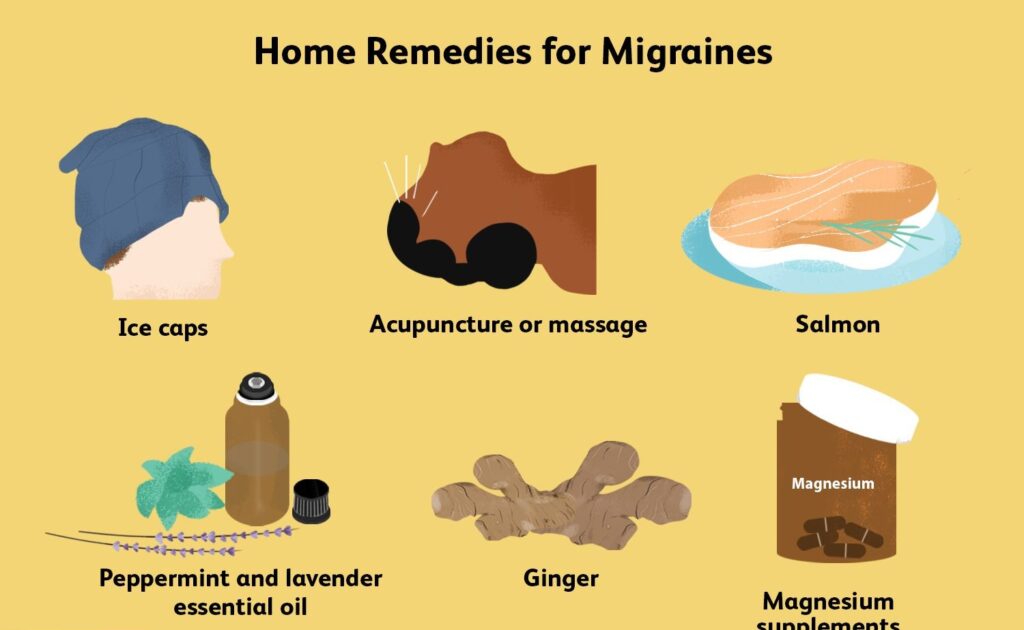Quick and Effective Headache Remedies You Need to Know
Explore effective remedies for various headaches, from tension to migraines, addressing the spectrum of symptoms and improving well-being through lifestyle changes and home remedies.
Causes of Headaches

- Dietary and Lifestyle Factors: Headaches can be influenced by choices such as alcohol consumption, caffeine withdrawal, dehydration, inadequate sleep, nutrient deficiencies, and insufficient calorie intake.
- Underlying Health Conditions: Serious issues like tumors, blood clots, or traumatic brain injuries can manifest as headaches, emphasizing the importance of considering broader health concerns.
- Medication Overuse and Infections: Excessive use of medications and infections within the central nervous system are additional factors that can lead to headaches.
- Diagnostic Approach: Maintaining a headache diary by recording timing, activities before headaches, diet, and relevant details helps identify patterns and potential triggers.
- Professional Evaluation: Persistent or worsening headaches, especially when accompanied by concerning symptoms, necessitate consultation with a healthcare professional for a thorough evaluation and diagnosis.
- Tailored Management Plan: Healthcare professionals can offer guidance, recommend tests if necessary, and develop personalized plans for effective headache management and prevention.
Natural Remedies for Headaches: Finding Relief Beyond Painkillers

Headaches, often an unwelcome visitor, can disrupt our daily lives. Instead of reaching for painkillers, consider these natural remedies that not only provide relief but also address the root causes of headaches.
1. Hydration: Adequate water intake and water-rich foods reduce the likelihood, duration, and intensity of headaches by addressing dehydration, a common trigger.
2. Quality Sleep: Establishing a consistent and adequate sleep routine (7–9 hours per night) prevents imbalances linked to poor sleep quality, reducing headache frequency.
3. Moderate Alcohol Intake: Limiting alcohol consumption helps avoid triggers like inflammation and dehydration, leading to a significant reduction in tension headaches and migraines.
4. Histamine-Aware Diet: Eliminating histamine-rich foods alleviates headaches in sensitive individuals, addressing the impact of enzyme dysfunction on migraine onset.
5. Essential Oils: Peppermint, lavender, and eucalyptus oils offer natural and soothing relief from headaches when diffused or applied topically.
6. B-Complex Vitamins: Supplements of B2, folate, B12, and B6 effectively reduce headache symptoms by supporting neurotransmitter synthesis and energy production.
7. Cold Compress: Applying a cold compress to the neck, head, or temples constricts blood vessels, reduces inflammation, and provides immediate relief from certain types of headaches.
8. Ginger’s Healing Touch: Ginger, rich in antioxidants and anti-inflammatory substances, proves effective in reducing migraine pain when consumed through supplements or tea.
9. Identify Triggers with an Elimination Diet: Temporarily removing potential trigger foods through an elimination diet helps identify and manage specific elements contributing to headaches.
10. Caffeine Boost: Caffeinated beverages complement common headache medications, enhancing their effects and improving mood, but mindful consumption is crucial to avoid withdrawal headaches.
11. Explore Acupuncture: Stimulating specific points in the body through acupuncture reduces migraine frequency and severity by promoting natural pain relief.
12. Yoga for Holistic Well-being: Incorporating yoga into conventional care significantly reduces headache frequency and intensity, addressing both physical and mental aspects.
13. Avoid Strong Smells: Steering clear of strong odors, including perfumes and cigarette smoke, decreases the likelihood of triggering headaches in sensitive individuals.
14. Herbal Allies: Curcumin, chamomile, and butterbur present promising results in reducing headache symptoms, providing a natural way to manage headaches.
15. Be Nitrate Aware: Opting for nitrate-free products and limiting processed meat intake reduces exposure to nitrates, potential headache triggers.
16. Move More, Hurt Less: Regular physical activity significantly reduces headache frequency and severity, making exercise an integral part of a holistic approach to natural headache management.
How to Prevent Headaches?
Prevention is always better than cure. Rather than trying out different remedies once you have a headache, it is best to follow ways to try and avoid them. To prevent headaches, you can try implementing the following tips:

- Stay Hydrated: Maintain adequate hydration to lower the risk of headaches; listen to your body’s thirst signals and adjust water intake based on factors like activity levels and climate.
- Identify Underlying Causes: Consult a healthcare professional to evaluate and address potential triggers for frequent headaches, including nutrient deficiencies and other underlying issues.
- Consistent Eating Habits: Avoid undereating and caloric restriction to prevent headaches; ensure a steady intake of calories throughout the day and avoid prolonged periods without eating.
- Optimal Sleep Patterns: Maintain a balanced sleep routine of 7-9 hours to prevent headaches; both sleep deprivation and excessive sleep can trigger constant and prolonged headaches.
- Stress Management: Implement healthy stress management techniques, such as regular exercise, meditation, and yoga, to reduce stress levels and prevent headaches, a common trigger.
- Seek Professional Guidance: Consult a healthcare professional for personalized strategies to reduce the frequency, duration, and severity of headaches; collaborate on a tailored plan for overall well-being.
By incorporating these strategies and seeking guidance from a healthcare expert, one can effectively reduce the occurrence of headaches and enhance overall well-being.
The Final Word
In embracing a holistic and health-conscious approach, a plethora of natural remedies stands ready to alleviate and prevent headaches. From maintaining hydration and embracing quality sleep to stress management and exploring alternatives like acupuncture and ginger, these strategies collectively offer a comprehensive toolkit for enduring relief. By adopting these practices, individuals can find comfort and well-being, moving beyond pharmaceutical interventions towards a more balanced and sustainable approach to headache management.
Research Sources
The Role of Diet and Nutrition in Migraine Triggers and Treatment: A Systematic Literature Review
Sleep Disorders and Headache: A Review of Correlation and Mutual Influence
Association of drinking water and migraine headache severity
Sleep disturbances in tension-type headaches and migraine
Migraine and Sleep—An Unexplained Association?
Alcohol and migraine: trigger factor, consumption, mechanisms. A review.
Migraine, Allergy, and Histamine: Is There a Link?
Review of aromatherapy essential oils and their mechanism of action against migraines
Efficacy of Diet Restriction on Migraines
Caffeine in the management of patients with headache
Effectiveness and Safety of Acupuncture for Migraine: An Overview of Systematic Reviews









